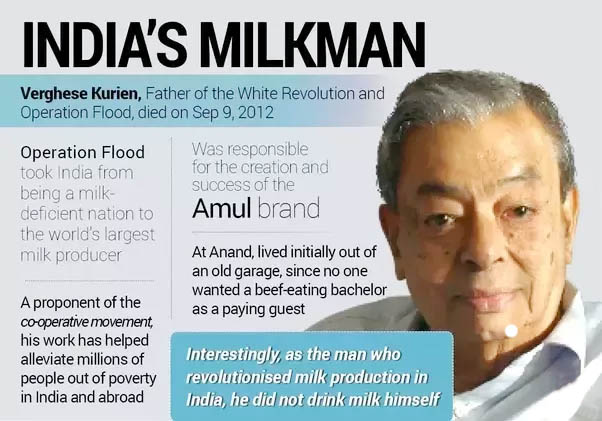Indian Economy
Crisis in the Dairy Sector
- 04 Aug 2020
- 8 min read
This article is based on “Covid and Milk” which was published in The Indian Express on 04/08/2020. It talks about the current crisis in the dairy sector.
India has transformed from a country of acute milk shortage to the world’s leading milk producer. This phenomenal success is attributed to a Government initiative known as Operation Flood (1970–1996) and its intense focus on dairy development activities.
Over the past few decades, the Dairy sector has emerged as a lifeline of the rural economy in India. However, given the high price elasticity of milk and milk products, the demand for milk is very sensitive to price changes.
Covid-19 pandemic has severely affected the demand for milk, particularly in urban areas. This has severely impacted the profitability of the dairy sector as an enterprise.
Given the importance of dairy sectors, for both farmers and consumers, there is a need for governments at various levels to address this crisis and establish a holistic framework for the overall growth of the sector.
Current Crisis in Dairy Sector
- Production of milk is subject to seasonal fluctuations — animals, particularly buffaloes, produce more during winter-spring and less in the summer.
- In order to cope with this fluctuation, the farmers usually convert the surplus milk of the “flush” season (winter) into skimmed milk powder (SMP) and ghee/butter for reconstitution in the “lean” months (summer).
- The above balancing model is, however, being rendered dysfunctional by the demand destruction caused in the post-Covid shutdown of hotels, restaurants, hostels, canteens and mithai shops.
- Apart from this, bulk sale of milk has collapsed (as nearly no marriages and other social functions taking place).
- This has slashed milk prices by Rs 10-13 per litre.
- Further, dairies have been accumulating powder and fat stocks through the summer and monsoon months.
- This overstocking situation will worsen once production increases in the coming months with improved fodder availability, calving of buffaloes and drop in temperature.
- This demand and supply mismatch has led to a crisis in the Dairy sector.
Other Issues Ailing Dairy Sector
- Slowdown in Dairy Sector: Even as India’s milk output has more than doubled in the last 15 years, the growth has slumped to less than 3 % in recent years, raising cause for concern.
- The slowdown is attributed to the decline in investment in the dairy sector since the end of the Operation Flood initiative.
- Lack of Budgetary Allocation: Dairy is currently the top-ranking commodity in India, with the value of output almost equal to the combined output value of rice and wheat.
- Despite the importance of the dairy sector in overall GDP, it receives less government budgeting than the agriculture sector.
- Informal Dairy Economy: The most basic feature of the Indian dairy sector is that it is still predominantly unorganized. Of the total milk produced in India, only 18-20% is channelized via the organized sector.
- The unorganised sector accounts for about 75% of the marketable surplus of milk. Due to this, the unorganized sector is yet to participate in the modern processing infrastructure.
- Poor Breeding Infrastructure and Genetics: The success of Indian dairy was mostly due to the rising number of animals, not productivity.
- There are storages of breeding infrastructure and advanced breeding methods such as artificial insemination, embryo transfer etc.
- Animal Feed and Fodder: There is an acute and ever-growing shortage of green fodder and good quality feed.
- Lack of Cold Chain Infrastructure: There is a lack of required infrastructure of chilling plants and bulk coolers to prevent contamination and spoilage at village level.
- Further, the existing chilling plants suffer due to shortage of electricity.
Way Forward
Short-Term Measure
- The government should consider temporary procurement of milk, directly by the National Dairy Development Board (NDDB).
- NDDB may create a buffer stock of processed dairy products like skimmed milk powder (SMP) and butter.
- Also, state governments may consider distributing these dairy products in Mid-May Meal, when schools reopen.
- By this way, the crisis in the dairy sector and nutritional security both can be addressed.
Long-Term Measures
- Increasing Productivity: There is a need to increase the productivity of animals, better health care and breeding facilities and management of dairy animals. This can reduce the cost of milk production.
- Also, milk production and productivity can be enhanced by ensuring the availability of veterinary services, artificial insemination (AI), feed and farmer education.
- The Government and dairy industry can play a vital role in this direction.
- Augmenting Production, Processing and Marketing Infrastructure: If India has to emerge as a dairy exporting country, it is imperative to develop proper production, processing and marketing infrastructure, which is capable of meeting international quality requirements.
- Thus, there is a need for a comprehensive strategy for producing quality and safe dairy products that should be formulated with suitable legal backup.
- Further, to address the infrastructure deficit in rural areas and address the power shortage, there is a need to invest in solar powered dairy processing units.
- Also, there is a need to strengthen dairy cooperatives. In this pursuit, the government should promote farmer producer organisations.
Conclusion
Demand for dairy products in India is likely to grow significantly in the coming years, driven by more consumers, higher incomes and greater interest in nutrition. Further, the dairy industry is critical for realising the goal of doubling the farmer’s income. Therefore, supply-demand balancing remains the issue of utmost importance for the dairy sector.
|
Drishti Mains Question “Milk is a unique crop that farmers harvest daily”. In light of the statement, discuss the issues with the dairy sector in India. |





